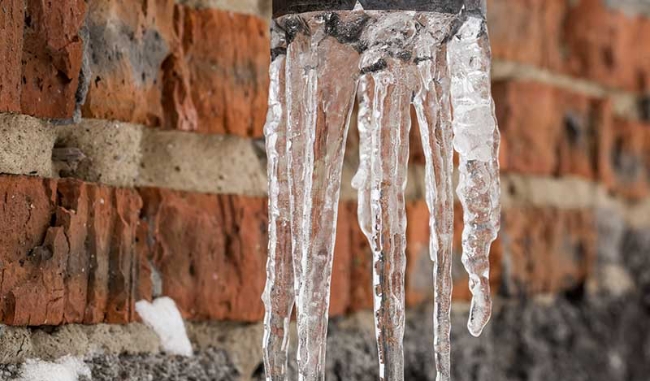What're your beliefs about Winter Plumbing Precautions: Preventing Frozen Pipes?

Winter can ruin your plumbing, especially by freezing pipelines. Here's exactly how to stop it from taking place and what to do if it does.
Introduction
As temperature levels drop, the danger of icy pipelines rises, possibly leading to costly repairs and water damage. Understanding how to stop icy pipelines is vital for house owners in cool environments.
Avoidance Tips
Insulating vulnerable pipelines
Wrap pipelines in insulation sleeves or use heat tape to shield them from freezing temperature levels. Focus on pipes in unheated or external areas of the home.
Heating methods
Keep indoor spaces sufficiently heated, particularly areas with pipes. Open up cabinet doors to allow cozy air to distribute around pipelines under sinks.
How to recognize frozen pipes
Try to find decreased water flow from taps, uncommon odors or noises from pipelines, and noticeable frost on revealed pipes.
Long-Term Solutions
Structural modifications
Take into consideration rerouting pipes away from exterior walls or unheated areas. Add additional insulation to attics, cellars, and crawl spaces.
Updating insulation
Purchase high-grade insulation for pipelines, attic rooms, and wall surfaces. Correct insulation aids preserve constant temperatures and decreases the risk of frozen pipelines.
Shielding Outside Plumbing
Garden tubes and exterior faucets
Disconnect and drain pipes yard hose pipes prior to winter months. Set up frost-proof spigots or cover exterior faucets with shielded caps.
Comprehending Frozen Pipelines
What creates pipes to ice up?
Pipes freeze when revealed to temperatures below 32 ° F (0 ° C) for expanded durations. As water inside the pipelines ices up, it broadens, putting pressure on the pipeline walls and potentially creating them to burst.
Dangers and problems
Frozen pipes can bring about water system disturbances, residential property damages, and expensive repair services. Ruptured pipelines can flooding homes and create extensive structural damage.
Indications of Frozen Piping
Identifying frozen pipes early can prevent them from bursting.
What to Do If Your Pipelines Freeze
Immediate activities to take
If you believe frozen pipes, keep taps available to ease pressure as the ice thaws. Utilize a hairdryer or towels taken in hot water to thaw pipelines slowly.
Conclusion
Stopping frozen pipelines requires positive measures and fast responses. By comprehending the reasons, signs, and safety nets, homeowners can secure their pipes during cold weather.
Helpful Tips to Prevent Frozen Pipes this Winter
UNDERSTANDING THE BASICS: WHY PIPES FREEZE AND WHY IT’S A PROBLEM
Water freezing inside pipes is common during the winter months, but understanding why pipes freeze, and the potential problems it can cause is crucial in preventing such incidents. This section will delve into the basics of why pipes freeze and the associated problems that may arise.
THE SCIENCE BEHIND FROZEN PIPES
When water reaches freezing temperatures, it undergoes a physical transformation and solidifies into ice. This expansion of water as it freezes is the primary reason pipes can burst. As the water inside the pipe freezes, it expands, creating immense pressure on the walls. If the pressure becomes too great, the pipe can crack or rupture, leading to leaks and water damage.
FACTORS THAT CONTRIBUTE TO PIPE FREEZING
- Low Temperatures: Extremely cold weather, especially below freezing, increases the risk of pipes freezing.
- Uninsulated or Poorly Insulated Pipes: Pipes located in unheated areas, such as basements, crawl spaces, or attics, are more prone to freezing. Insufficient insulation or lack of insulation altogether exacerbates the problem.
- Exterior Wall Exposure: Pipes running along exterior walls are susceptible to freezing as they encounter colder temperatures outside.
- Lack of Heating or Temperature Regulation: Inadequate heating or inconsistent temperature control in your home can contribute to frozen pipes.
PROBLEMS CAUSED BY FROZEN PIPES
WHY CERTAIN PIPES ARE MORE PRONE TO FREEZING
- Pipe Bursting: As mentioned earlier, the expansion of water as it freezes can cause pipes to burst, resulting in significant water damage.
- Water Damage: When pipes burst, it can lead to flooding and water damage to your property, including walls, ceilings, flooring, and personal belongings.
- Structural Damage: Prolonged exposure to water from burst pipes can compromise the structural integrity of your home, leading to costly repairs.
- Mold and Mildew Growth: Excess moisture from water damage can create a favorable environment for mold and mildew growth, posing health risks to occupants.
- Disrupted Water Supply: Frozen pipes can also result in a complete or partial loss of water supply until the issue is resolved.
https://busybusy.com/blog/helpful-tips-to-prevent-frozen-pipes-this-winter/
- Location: Pipes located in unheated or poorly insulated areas, such as basements, crawl spaces, attics, or exterior walls, are at higher risk of freezing.
- Exterior Pipes: Outdoor pipes, such as those used for irrigation or exposed plumbing, are particularly vulnerable to freezing as they are directly exposed to the elements.
- Supply Lines: Pipes that carry water from the main water supply into your home, including the main water line, are critical to protect as freezing in these lines can affect your entire plumbing system.
- Underground Pipes: Pipes buried underground, such as those connected to sprinkler systems or outdoor faucets, can be susceptible to freezing if not properly insulated.

I discovered that blog entry about Preventing and dealing with frozen pipes while perusing the internet. Do you know somebody who is fascinated with the subject? Feel free to share it. Thanks for your time. Revisit us soon.
Click Here
Comments on “Ways to Protect Pipes from Cold Weather Damage: Essential Tips”